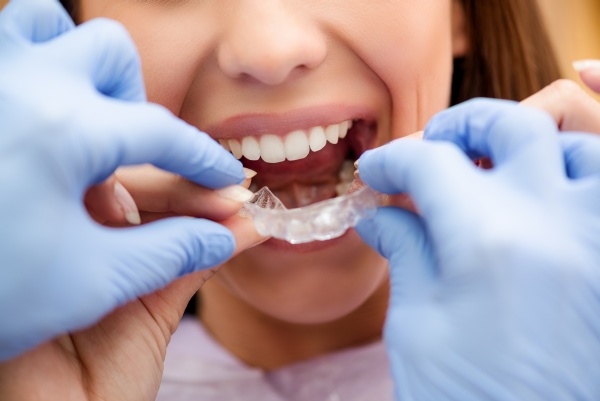How Does Clear Aligner Treatment Feel?

A clear aligner treatment has become one of the most popular methods for teeth straightening. As dentistry has continued to improve, more and more people are choosing clear aligners as their primary method for improving their smiles. Being aware of how clear aligners work and feel may be helpful for someone considering their options.
If you are considering clear aligners, then you may find this article helpful. We outline how aligners feel in the mouth, as well as how the treatment process may impact you. Read on to learn more about clear aligners!
How do clear aligner treatments feel?
This method of treatment is known to be relatively simple, but there are a few important things to note about the way that it feels.
Minor pain
Saying that clear aligners cause pain is not quite accurate! Unlike traditional metal braces, clear aligners do not cause the same type of pain that braces do. Because the aligner is made as just one piece, the teeth shift all at once, as opposed to the individual tooth shifts that occur with traditional braces.
Some people report that their clear aligners cause minor pain around their gums and beneath their teeth during treatment, which is normal. Because the teeth aligners are working to shift the teeth, there is bound to be some amount of discomfort; however, it is rare that intense pain should occur.
Soreness
The most common thing that patients report about their clear aligners is that their mouths are sore. Again, because the teeth are shifting into a straighter position, it can cause the gums and teeth to feel sore. Dentists believe that soreness is a good indicator that the clear aligners are working.
Teeth rarely naturally move on their own so when clear aligners are introduced, they give the teeth a little push, which can cause the mouth to feel sore. If no soreness is felt, that may indicate the aligners are not working properly.
Treatment process
Most methods of teeth straightening cause minor discomfort within the mouth, but with the help of over-the-counter pain medications and good oral hygiene, over time, the mouth should adjust to the clear aligner treatment process. It is recommended to avoid chewing on especially hard items that could induce more pain or discomfort.
Ultimately, if any feelings of pain or severe discomfort are continuous, then it may be best to consult with a dentist. There are rare times where the clear aligners are not properly fitted, which can cause unnecessary pain within the mouth.
Contact us today
Are you considering clear aligners? Our team of dentists can help get you started. All teeth straightening options come with mild soreness or minor discomfort, but clear aligners also offer ease. If aligners sound like something that you are interested in, then give us a call or stop by our office today so we can help you! We can answer any questions that you may have.
Request an appointment here: https://metrosmiles.com or call Metro Smiles Dental at (718) 841-9591 for an appointment in our Forest Hills office.
Check out what others are saying about our services on Yelp: Read our Yelp reviews.
Related Posts
Whether you are missing a tooth or have a cracked tooth that needs repair, restorative dentistry can help. This article will discuss some of the most common dental restoration services available today.A tooth-colored filling, also known as composite resin, is made of plastic and can be used to replace decayed areas of teeth. The material…
Clear braces and other orthodontic advances make teeth straightening treatment more attractive to many patients. From clear aligners to ceramic braces, these innovative treatments allow patients to align their smiles without noticeable metal brackets and wires. Thanks to these alternatives, teeth straightening has become more accessible to those who want to avoid traditional metal braces.Traditional…
Cracked and chipped teeth can be unsightly and painful, but dental restoration can help. Even a painless chip or crack may become a bigger problem if left untreated. Severe pain, swollen and tender gums, and infection may result. In the worst cases, it will be necessary to extract the broken tooth. There are many ways…
You may need a type of dental restoration at some point in your life. There are many types of treatments available. Knowing how to select each one can give you the results that you need. Here are some tips on how to choose the right type of dental restoration procedure that will fit your dental…
